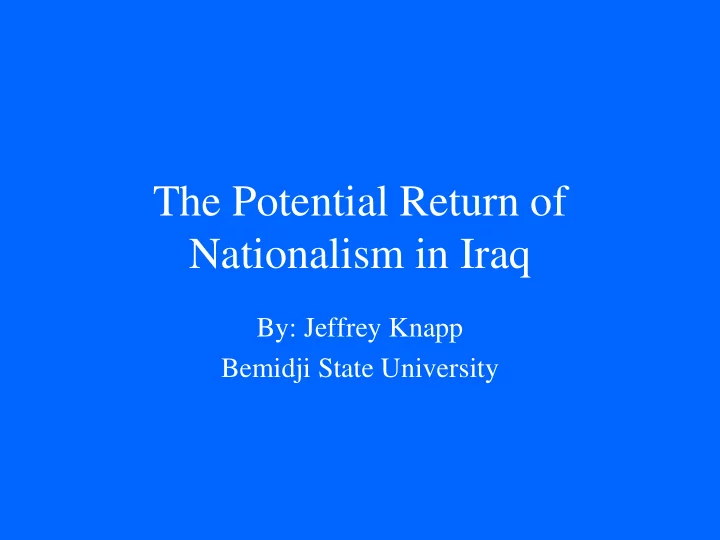

The Potential Return of Nationalism in Iraq By: Jeffrey Knapp Bemidji State University
Why Did I Pick This Topic ?
Iraq’s Atmosphere Today • Country that’s struggling to become an emerging democracy • Insurgent violence • Strong ethnic tensions (past and presently) • Since 2003 Iraqis have participated in several elections
2010 Sample Ballot
2010 Election Results
Iraq’s Dominate Ethno-Religious Makeup • Shiite Muslims • Sunni Muslims • Kurds
Iraq’s History of Nationalism and Three Attempts to Unify • In 1920 Iraqi’s were unified in protest over the British monarchy • In 1958 Qasim became PM and sectarianism disappeared • In 1991 Charter 91 was formed
Previous Research • Muller (2008) examined the two most common ways of defining nationalism (liberal nationalism and ethno-nationalism) • Inglehart (2006) analyzed the effects of a foreign occupying force has on indigenous people • Foreign Occupation and National Pride: The Case of Iraq; Mansoor Moaddel (2008)
Methods and Analysis • World Values Survey (WVS) • Survey was conducted in 2006 throughout the eighteen provinces in Iraq • The data was analyzed with SPSS
Independent Variables • Region of Interview • War - asked respondents if they would fight in a war for their country • Shiite, Sunni, Kurd, and Gender are all dichotomous variables • Age, Education, Income
Dependent Variables • Nationalism Index • Total-trust Index
Unit of Analysis • Individuals
Individual Levels of Nationalism and the Region of the Interview
Iraqi Nationalism and if they would Fight in a War Be willing to fight in war for your country yes no Total How proud of nationality Very proud 651 1131 1782 80.7% 83.8% 82.6% Quite proud 132 177 309 16.4% 13.1% 14.3% Not very proud 15 24 39 1.9% 1.8% 1.8% Not at all proud 9 18 27 1.1% 1.3% 1.3% Total 807 1350 2157 100.0% 100.0% 100.0% Chi- Square=.221 Lamda=.000
Multivariate Regression Analysis of Iraqi Nationalism by Religious, Ethnic, and Demographic Variables Coefficient t Score Significance Religious Identity Constant 5.630** 51.989 .000 Shiite -.115* -2.100 .036 Sunni -.111 -1.278 .202 Ethnic Identity Kurd -.605** -8.264 .000 Demographic Variables Gender .045 .940 .348 Age .000 -.569 .569 Education -.009 -.894 .371 Income .022 1.537 .125 *= significance at .05 **= significance at .01 Adjusted R Square=.037
Multivariate Regression Analysis of Iraqi Trust by Religious, Ethnic, and Demographic Variables Religious Coefficient t Score Significance Identity Constant 4.403** 28.683 .000 Shiite -.272** -3.424 .001 Sunni -.382** -3.182 .001 Ethnic Identity Kurd -4.52** -4.281 .000 Demographic Variables Gender .290** 4.181 .000 Age .013** 5.108 .000 Education .048** 3.436 .001 Income .004 .184 .854 *=significance at .05 **=significance at .01 Adjusted R Squared=.037
Conclusion • Wait and see if this newly elected government can stop ethno-religious conflicts that still threaten Iraq’s stability • Run analysis again when the new WVS data comes out to see if results are similar • Watch the news for current events that effect the future of Iraq’s democracy such as the battle over Kirkuk
Recommend
More recommend